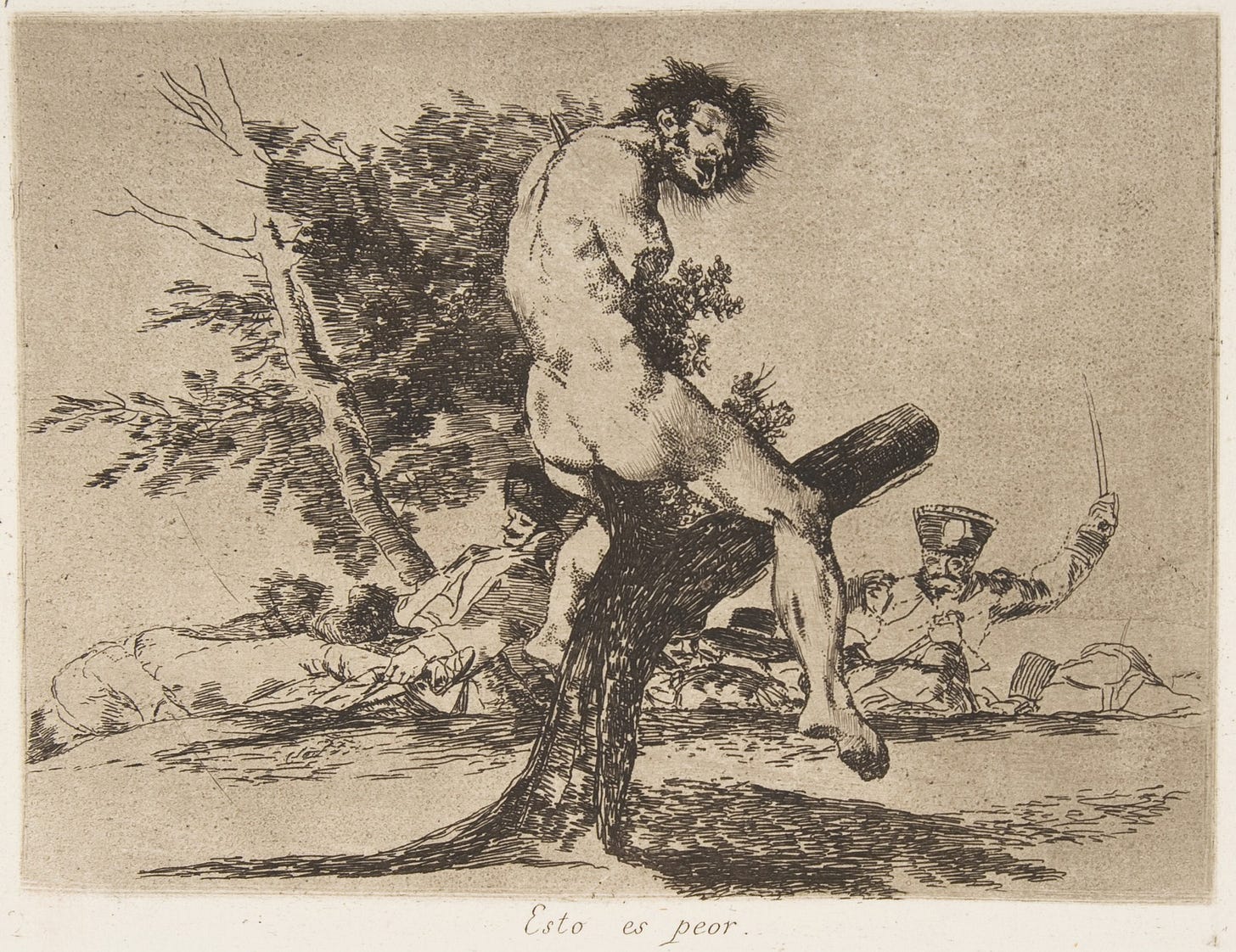Necessary Evils: Gaza's Dilemma
The silent complicity of those comfortably watching the inescapable evil of Palestinian Genocide is cowardice masked as peace and moral bankruptcy by inaction
In the theater of suffering that Gaza has become, we find ourselves not merely spectators but unwitting accomplices. The blood-soaked territory reveals not just the horror of physical annihilation but the deeper desolation of moral courage. For seventy-five years, Palestinians have endured oppression, apartheid, murder, imprisonment, torture, exile—a catalogue of torments that forces upon them not a question of action or inaction, but a choice between one evil and another.
The dilemma confronting the Palestinian people is excruciating precisely because it admits no innocent resolution. Those who resist through violence commit an evil; those who stand by commit another. It is the peculiar poison of our age that we believe in the possibility of clean hands amid the filth of history.
What feeble comfort we take in our nonviolence! The beautiful souls of our era tremble before the specter of "terrorism," cloaking their cowardice in righteous condemnation. They recoil at bodies cut in two pieces in public squares yet remain unmoved by the slow strangulation of an entire people. These faint hearts fail to see that their inaction is itself an action—perhaps the most contemptible of all. They imagine themselves innocent while providing cover for massacre.
Socrates faced his dilemma with admirable clarity, choosing death over escape, weighing the evil of violating Athens' laws against the evil of abandoning his children and friends. But how quaint his concern for legal purity seems against the backdrop of genocide! The Athenian philosopher at least recognized his options; our contemporaries refuse even to acknowledge the true nature of their choice.
Machiavelli understood what moral philosophers obstinately denied: that the world forces upon us decisions in which no path leads to goodness. His Cesare Borgia exhibited a cruel compassion by executing Remirro de Orco—a selective violence that prevented greater bloodshed. The prince who refuses such responsibility, who shrinks from necessary evil, commits the greater sin of allowing preventable suffering.
Kant's murderer at the door illustrates this moral impasse perfectly—a thought experiment where a killer asks you about a victim hiding in your home, forcing you to either lie (violating Kant's moral imperative never to lie) or tell the truth and enable murder. Kant himself maintained that truth-telling remained an absolute duty, yet recognized that either choice constitutes a wrong—to humanity in general or to the potential victim. There is no escape from the stain of evil; one can only choose its scope and target.
The Palestinians face their own murderer at the door, but one who has already occupied the house, confined them to a closet, and now wishes to exterminate them entirely. UN resolutions fail. Protests fail. Boycotts fail. The butchers of Gaza do not relent before such polite objections. If violent resistance might succeed where peaceful means have failed—if bodies in piazzas might accomplish what diplomacy cannot—then it would be wrong not to embrace this lesser evil.
This is the unbearable truth that our comfortable moralists cannot stomach: that sometimes the good consists in choosing the right kind of evil. The world's oppressed cannot afford the luxury of moral purity. Their dilemma is not whether to dirty their hands but how to dirty them to greatest effect.
Those who redescribe resistance as terrorism, who retreat into facile slogans about peace while genocide unfolds before their eyes, have chosen their side. They have not avoided evil; they have merely chosen the evil of complicity. Their inaction is action, their silence is speech—in defense of tyranny.
What remarkable self-deception allows us to believe that Gandhi, King, and Mandela employed "nonviolent" means! Their boycotts, strikes, and marches were themselves forms of violence—attempts to impose their will upon oppressors. That blood was mostly spilled by their enemies does not change the fundamental nature of the conflict. These methods succeeded against particular opponents in particular circumstances; they would have failed utterly against Hitler, as they fail now against an Israel supported by the hypocritical might of the West.
The horror in Palestine is not an aberration but a constant state of affairs, a seventy-five year regime of calculated dehumanization. To condemn the resistance while qualifying that condemnation with references to the "horror of October 7" is to betray a fundamental misunderstanding of historical reality. Horror has been the Palestinians' daily bread for generations.
We stand now at the precipice of moral decision. The evil state that carries out systematic oppression must be opposed by means that cannot but be themselves evil. The hard choices made by those who fight against tyranny may yet redeem not only themselves but all of us who have hidden our cowardice behind the veil of peaceful intentions.
There is no innocence to be found here—only the agonizing honesty of choosing which evil we will serve. For even doing nothing is doing something, and specifically something evil. The laziness of moral calculation, the refusal to confront the hardest questions, the retreat into comfortable platitudes—these are not paths to virtue but to complicity in crimes too vast to comprehend.
The faint of heart should crawl from their hiding places and face the pitiless truth: in Gaza, as in life, we all have blood on our hands. The only question is whether it will be the blood of the oppressors or the oppressed.
Text written by Panagiotis Chatzistefanou, exclusively for the Psychonaut Elite, Berlin, April 2025







"Those who redescribe resistance as terrorism, who retreat into facile slogans about peace while genocide unfolds before their eyes, have chosen their side. They have not avoided evil; they have merely chosen the evil of complicity. Their inaction is action, their silence is speech—in defense of tyranny."